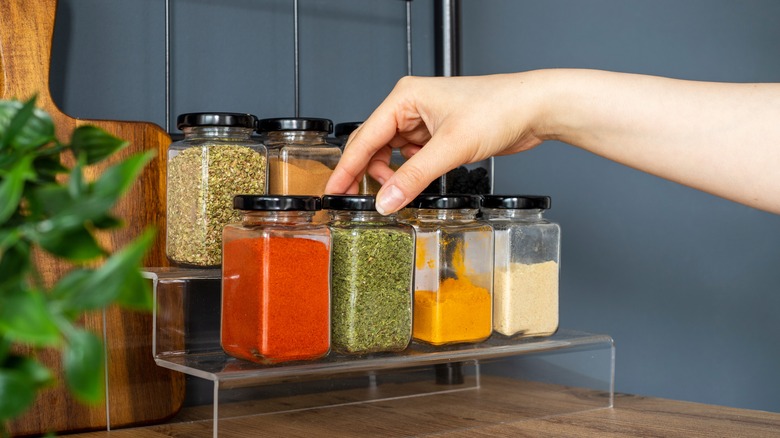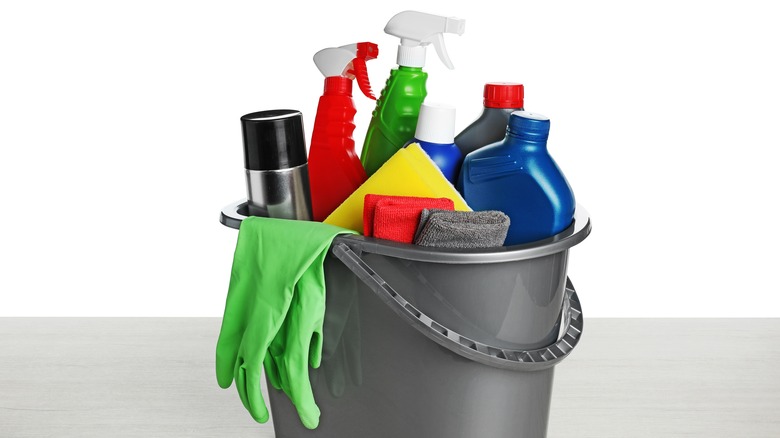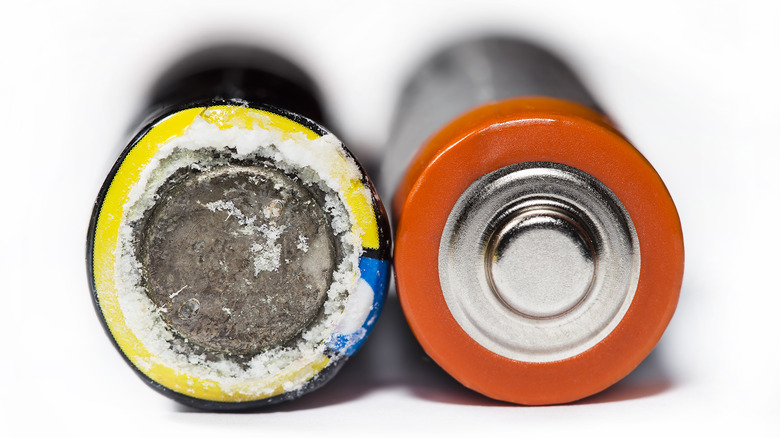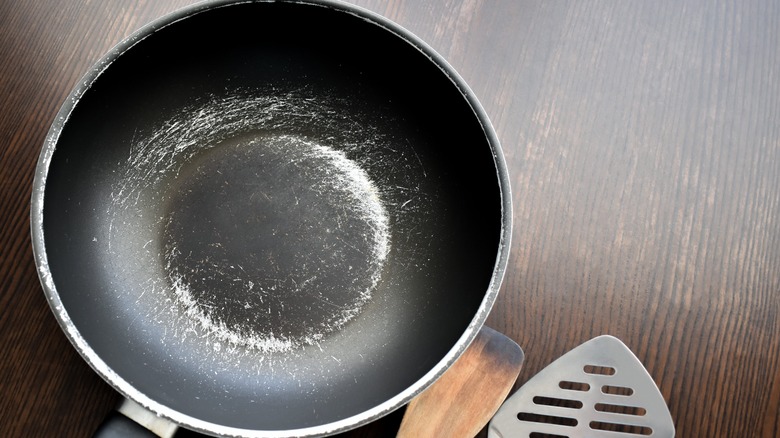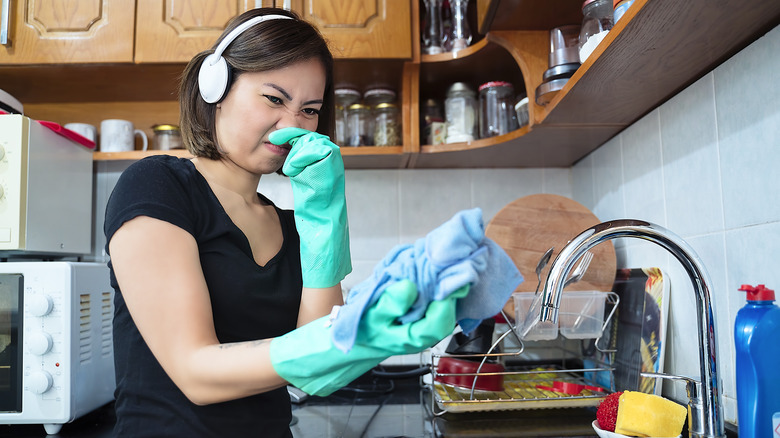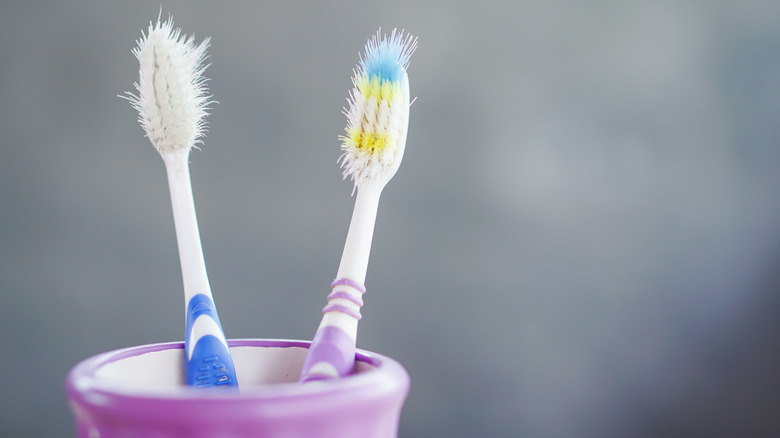Telltale Signs These Household Staples Need To Be Thrown Out
Sweeping the floors, dusting, and tossing outdated items to make room for new ones are all part of a good cleaning routine. But how do you know something has gone bad? This is tricky because some household staples might not show obvious signs, like you'd see with sour milk or moldy bread. If you don't see anything jump out at you that something is off, you fall into the trap of assuming your household staples last forever. However, this isn't the case; you should be checking and replacing things all around your home. When was the last time you swapped out your toothbrush or refreshed your spices? Are they all still good?
It's easy to prioritize the visible clutter when cleaning up, but what about those ones neatly tucked away? You want to take a hard look at the signs that it's time to refresh or replace your staples. Understanding the indicators, from your cleaning supplies not working as well to your towels smelling like mildew, is critical for helping you keep your house safe and healthy. To prevent this, we'll clue you in on the telltale signs that it's time to replace your household staples, and you can look around your house to see if any have slipped through the cracks.
Spices and herbs lose their aroma and flavor
Herbs and spices have many uses around the house. However, with age, these things start losing their smell and flavor. The oils gradually degrade, and the spices and herbs dry out, becoming less potent in home or garden projects. You may find yourself adding much more than usual to keep moths out of the closet or to amend your garden soil.
While changing your spices and herbs is essential, how often should you clean the spice cupboard or rack? Generally, whole spices will stay potent for two to four years, while ground lasts two to three years when you store them at room temperature. Fresh herbs last up to three weeks in the refrigerator, and dried herbs for up to two years. Whole spices have a longer shelf life because the oils get preserved inside the intact leaf, seed, or bark until you use them. Fresh spices are better for keeping pests out of the house or garden because they ensure the scent and oils are as potent as possible.
Medications are less potent or expired
Did your doctor prescribe you medicine, or do you take a daily over-the-counter medication like Tylenol? If so, note their expiration date and swap them for new ones when you reach it because they lose their potency. The manufacturer sets this expiration date, which is when they guarantee you'll get the full effects. Once the expiration date comes, any active ingredients can stop working, making the medications less effective in treating whatever you're taking them for. Having less potent medicine can be dangerous if you take it to help with chronic conditions where you need it to be as effective as possible.
Set aside a few hours to sort through your pills at least once a year and put the expired meds in a pile to replace and get rid of. The medications that aren't expired can go back into a cool-dry spot, like your medicine cabinet. Keep them out of the direct light and away from moisture or heat because this can break them down quicker. Learn how to properly dispose of your old medication so you don't flush them down the toilet and let them into the local ecosystem.
Cleaning supplies separate and lose effectiveness
Have you ever gone into your cleaning supplies cabinet and noticed they separated? Maybe they don't take care of grease or cut through grime as well. Cleaning products have chemicals that combine, break down, and remove grease, stains, and germs. The chemicals slowly break down or separate, especially if you don't store them correctly. Shaking the bottle can temporarily mix the layers, but the cleaner usually won't be as effective. In response, you'll scrub harder and use more cleaning supplies to tackle your cleaning projects.
Cleaners claim many popular cleaning products last between six months and two years. Bleach lasts roughly six months before it stops being as effective as disinfecting your home. The chemical components will break down during this time, especially if you store them all wrong, like in spaces with direct sun, high temperatures, or moisture. Replacing these items as they reach the expiration period ensures they're effective at getting rid of grime, bacteria, and dirt each time you clean. So keeping on top of your cleaning supplies saves your stuff and makes your home healthier and safer.
Batteries leak, corrode, or bulge
We tend to put batteries into whatever we need to run and forget about them until the thing stops running. But forgetting them is a problem because they can develop dangerous issues, like swelling or leaking. Leaking happens when the chemicals inside the batteries break down and come through the shell, leaving a white, crusty residue on both rechargeable and alkaline batteries. Corrosion occurs when oxygen and the battery's metal parts react, and you'll see a blue-green substance or rust that stops the battery from making a good connection to whatever you want it to power. If you spot a bulged spot, it's getting too hot in this area.
Remembering when to check and swap out your batteries is challenging because it varies based on the type you're using and what they're powering. Ideally, you'll check the batteries once a month, especially if they're inside something that runs around the clock. Along with checking for damage, batteries lose their charge over time, making them less effective. Swapping them out semi-regularly helps prevent this.
Pillows are lumpy, smell, or don't offer support
Have you ever laid down and found that your pillow smells, is lumpy, or doesn't give you the support you need to sleep? These are all signs your pillow has been in better shape. The filling will break down or clump up, making your pillows look and feel lumpy. This lowers the support you get when you sleep, too, and it may go flat. You also sweat while sleeping, which gets trapped inside the pillow, leading to mold or mildew growing and a musty scent.
Replace them every year or two, even if you know how to care for and clean your bed pillows. You may clean the surface, but dust mites, dead skin cells, and body oil get into the filling, and it comes into direct contact with your face as you sleep. Even if you change the pillowcase regularly, allergens can be embedded into the fibers. Each time you use your pillow, your pillow's structural integrity worsens, meaning you'll be less comfortable as it ages. Regularly replacing it ensures you're keeping your sleeping space clean to help you sleep better and get enough support for quality, uninterrupted sleep.
Canned foods have swollen or rusted cans
It's common to have more canned goods on hand than you can realistically eat in a week or two, but you want to inspect them before you use them to see if you spot rust or swelling. The swelling is usually from gasses trapped inside the can that bacteria release as they feed on the spoiled food. If you spot rust, this is another issue. A small amount of rust might not do anything, but a lot of rust compromises the can itself. Eating food out of a rusted or swollen can is dangerous and opens the door for foodborne illnesses because they hint that the food isn't vacuum sealed anymore, which keeps it safe to eat.
How often you toss and replace your canned goods depends on what they are, but you can safely keep most of them from one to five years if you put them in a dry, cool spot. Tomatoes, fruits, and other high-acid fruits are ones you want to use within 18 months because the acid will react to the can. Vegetables, meats, and other low-acid foods are good for two to five years. However, note that even cans that look fine can have subtle changes that affect how safe the food is to eat. Moisture, extreme temperatures, and chemical exposure all compromise the seal. Rotate and organize your canned goods and pay attention to their condition to ensure they're safe to eat.
Nonstick cookware has scratches or is peeling
It's time to consider replacing your nonstick cookware if you notice it peeling or scratching. You may think these things are just cosmetic, but they can cause bigger problems. The nonstick coating comes designed to give you a smooth cooking surface and stop things from sticking, making cooking easier. Once scratches or peeling happen, it lowers the cookware's safety. Scratches expose the underlying material, which can make your food stick and burn. If the coating peels, it can flake off into whatever you cook, and the compounds that were safe to have minor food contact may not be safe to eat.
How often you have to buy a new set depends on whether you use them every day or once or twice a week and whether they fall victim to cleaning mistakes that will ruin them, like putting them in the dishwasher. Generally, be ready to update your set every three to five years. How long it lasts also depends on the quality and whether you use metal utensils on them or cook at high heat. Along with it flaking off, older nonstick coatings can have chemicals that aren't safe for food contact. Newer nonstick cookware has safer and more advanced materials, so regularly updating your set ensures you cook with materials that meet the latest safety standards.
Towels are frayed and have a mildew smell
Using your towels eventually causes them to fray at the edges, and they may have a slight smell that seems impossible to remove. Fraying happens due to normal wear and tear, and it tells you that the fabric is slowly breaking down and is less durable. This makes your towels look worn and grungy but also impacts how well they dry. The mildew smell is a bigger concern, and this suggests that you let your towels stay damp for too long, letting mildew or mold grow deep in the fibers. Repeatedly using linens with these warning signs could result in skin irritation or allergies, making your bathroom unsanitary.
Replace your bath towels every two to three years as a general guideline. However, there is no hard and fast rule because this can fluctuate based on how much you use them. Doing so can ward off typical wear and tear and guarantee your towels won't break down to the point that they lose most of their absorbency. Regularly changing your towels encourages cleanliness by keeping bacteria and mold from developing and guaranteeing you utilize a dry, clean towel after a shower or bath. You may also use this idea to evaluate and improve your laundry routine, including ensuring that your towels are completely dry before folding and storing them to help them last longer. Purchasing high-quality linens can make them last longer and minimize holes and fraying.
Sponges and dishrags smell bad
If you've ever gone to clean something with a dishrag or sponge and found a bad smell, you're not alone. This is one surefire way to tell it's time to throw them out. They get wet and pick up little food particles when you use them, creating a perfect home for bacteria and mold. This development produces a foul odor, and using a contaminated towel or sponge spreads germs around your kitchen, which could lead to food poisoning. Even after cleaning, the odor can be hard to get out. Identifying problems and replacing them is crucial to keeping a safe and clean kitchen.
Replace or sanitize your sponges at least once a week and dishrags every two weeks, depending on how much you use them. Clean them between uses. You'll do this so often because sponges are a perfect breeding ground for germs. They absorb moisture and food particles that the mold and germs feed on. It's also an easy way to keep your kitchen sparkling clean. Wash your sponges and dishrags after every use and dry them completely.
Toothbrush bristles fray or flatten
Have you ever noticed how your toothbrush looks worn out, with those frayed bristles that just don't seem to do the job anymore? This is especially common if you press hard when you brush, but even gentle daily use will make the bristles wear out. Swapping out your old toothbrush for a fresh one can make a big difference. You get those straight, firm bristles back, ready to tackle food particles and plaque much more effectively. Ignoring this simple switch can turn your brush into a cozy hangout for bacteria.
Dental pros suggest a new brush every three to four months. Plus, a fresh brush means you're not giving a free ride to fungi, bacteria, or viruses, which is especially necessary during cold and flu season. As a bonus, you can repurpose the old toothbrush around the garden. Maybe you need a way to dust your plants without damaging them, or you want to gently separate your plant roots as you repot to look for root rot. Having a toothbrush handy lets you do this, along with scrubbing your garden tools or pots so they're ready to go in the spring.
Hydrogen peroxide turns into water
If you clean with expired hydrogen peroxide, did you know you're pretty much cleaning with water? When it's new, this is a powerful oxidizing cleaner that disinfects wonderfully. It has a chemical reaction that makes it bubble when it comes into contact with whatever surface you want to clean or your skin, and this tells you it's killing bacteria. However, it breaks down into oxygen gas and water and won't bubble anymore. The liquid stays clear, so you may not know it's gone bad. Using hydrogen peroxide that turns into water means you're not disinfecting anything, making cleaning with it useless.
Ideally, you'll replace your peroxide every six months to ensure it's effective. This seems short, and this is because it's an unstable compound. To make it last a few more months, keep it unopened in the original container and tuck it into a dark, cool spot until you need it. Once you open it, race to finish it within six months and store it correctly for the best results. If it's open and you're unsure if it's good, pour it onto something and see if it bubbles. If it does, it's good to go.

